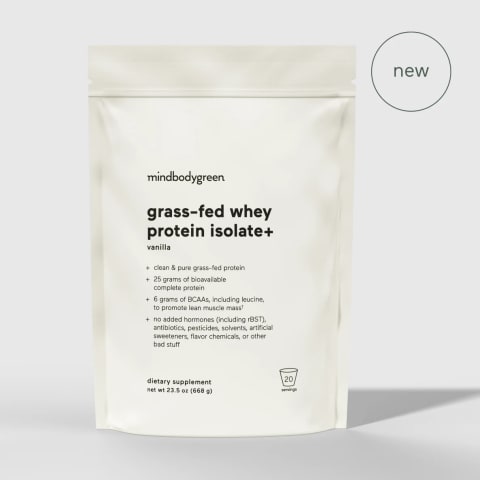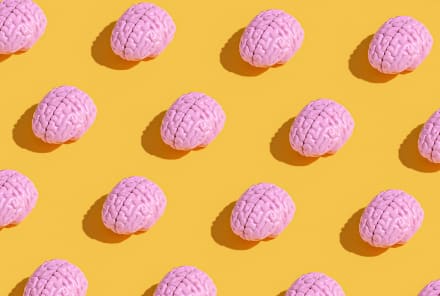Advertisement
4 Ways To Suppress Ghrelin & Finally Get Your Hunger Under Control


Do you always feel hungry (even shortly after eating a meal)? It could be a sign that your hunger hormones are off. That’s because most of our internal cues telling us that we’re hungry or full are governed by hormones. And many habits—not just what you eat—have the power to influence your appetite.
Let’s dive into the hunger hormone ghrelin and how to get it in check so you feel full and happy—-not constantly famished.
Meet ghrelin
When released, ghrelin travels through the bloodstream and into the brain—which increases your appetite and tells you it’s time to eat. It’s typically the highest before eating and lowest an hour after eating.
But a poor diet, stress management, and sleep can all cause an increase in ghrelin levels, even when you aren’t physiologically hungry.
These are 4 habits that help suppress this hunger hormone.
Eat more protein
Ghrelin is highly influenced by meal timing and composition. And it turns out that protein is the macronutrient most linked to sustained suppressed ghrelin levels. Meaning: If you eat a protein-rich meal, ghrelin levels will successfully decline (signaling fullness) and stay suppressed until you’re truly hungry again.
A 2020 study found that people eating high-protein diets reduced appetite2 (including hunger, desire to eat, and how much people thought they could eat) and boosted feelings of satisfaction after a meal). Not to mention, ghrelin levels decreased. However, a positive change in ghrelin was only observed when folks ate 35 grams or more of protein per meal.
While this may sound like a lot, most folks need a protein dose within that ballpark to reach their daily protein needs (which come in at a minimum of 100 grams a day).
If you’re not sure where to start, follow our zero-stress guide to eating more protein and consider adding a high-quality protein powder like mindbodygreen’s grass-fed whey protein isolate+ to your routine. Each serving provides 25 grams of clean protein to enhance any meal and snack (we recommend adding it to one of these breakfasts). Customers also rave that it’s the best-tasting protein powder they’ve had.
Bump up your fiber intake
Fiber is another dietary ingredient that plays a crucial role in appetite regulation.
Research shows that eating more fiber can enhance feelings of fullness by slowing digestion3 and shifting hormone secretion from hunger hormones to satiety hormones. Studies also show that higher fiber consumption is linked to lower ghrelin levels both during a fast and after a meal4.
But only 5% of all Americans get the recommended 25-38 grams of fiber daily—many only get 16 grams a day at most.
Bump up your fiber intake by eating more plant foods like beans, lentils, fruits, vegetables, and full grains (here’s a complete list of our 25 favorite high-fiber foods). If you really want to increase your soluble fiber intake—the type of fiber most notable for slowing digestion—try one of these targeted supplements.
Focus on sleep
Poor quality sleep and not sleeping enough play a sneaky important role in your metabolism and appetite.
Inadequate sleep decreases leptin5 and increases ghrelin. This can prompt your appetite to surge, making maintaining a healthy weight and choosing healthy foods for meals to be more challenging.
To improve your sleep quality, reduce screen time before bed, avoid caffeine and alcohol late in the day, and make sure your room is dark and cool. Try using a sleep mask to block out light even further (we linked our 5 favorites here).
Manage stress
Ghrelin is a hormone that also responds to stress6. It increases during both acute and chronic stress to help the body maintain balance.
In times of acute stress (say you’re worried about missing a connecting flight), the body interprets that feeling as a potential threat requiring energy to fight or flee and releases hormones like cortisol and ghrelin to get more energy.
That turns problematic when the stress becomes long-term, and these hormones remain constantly high and contribute to high blood sugar levels, insistent hunger, and a drive to eat calorie-dense foods.
Everyone manages stress differently, but regular exercise, sleeping well, and meditation are all research-backed ways to help your body recover from stressors efficiently.
The takeaway
Ghrelin levels are supposed to rise and fall with your hunger. But many people may struggle with consistently high levels of this hormone and struggle with always feeling snacky. Eating a high-protein, high-fiber diet as well as prioritizing sleep and managing stress will not only help get your hunger under control, but improve your metabolic health.
Watch Next
Enjoy some of our favorite clips from classes
Enjoy some of our favorite clips from classes
What Is Meditation?
Mindfulness/Spirituality | Light Watkins
Box Breathing
Mindfulness/Spirituality | Gwen Dittmar
What Breathwork Can Address
Mindfulness/Spirituality | Gwen Dittmar
The 8 Limbs of Yoga - What is Asana?
Yoga | Caley Alyssa
Two Standing Postures to Open Up Tight Hips
Yoga | Caley Alyssa
How Plants Can Optimize Athletic Performance
Nutrition | Rich Roll
What to Eat Before a Workout
Nutrition | Rich Roll
How Ayurveda Helps Us Navigate Modern Life
Nutrition | Sahara Rose
Messages About Love & Relationships
Love & Relationships | Esther Perel
Love Languages
Love & Relationships | Esther Perel



















